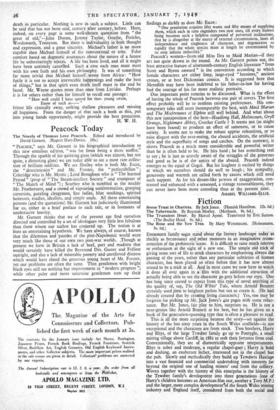Peacock Today
The Novels of Thomas Love Peacock. Edited and introduced by David Garnett. (Rupert Hart-Davies. 18s.)
PEACOCIC," says Mr. Garnett in his biographical introduction to this new omnibus edition, " was far from being a mere scoffer," Through the sparkle of his quizzing glass (which was almost, but not quite, a distorting glass) we are today able to see a most rare collec- tion of brilliant oddities. We see Shelley who is both Mr. Escot, the ".deteriationist " and Mr. Forster, the " perfectibilian " ; Coleridge who is Mr. Mystic ; Lord Brougham who is " The learned Friend " (prop of " The Steam-intellect Society " and trumpeter of " The March of Mind "); Southey who is tumbled as the muddy Mr. Feathemest; and a crowd of vapouring sentimentalists, grasping careerists, guzzling clergymen, fine ladies, blue stockings, spirited heiresses, toadies, idealists, and simple souls. All these entertaining persons (and the quotations) Mr. Garnett has judiciously illuminated kw us, either in a brief preface to each tale, or in footnotes of unobtrusive brevity.
Mr. Garnett thinks that we of the present age find ourselves directed and controlled by a set of ideologues very little less fabulous than those whom our author has conjured up. The notion is at least an entertaining hypothesis. We have always, of course, known that the dilemmas and 'puzzles of the post-Napoleonic world were very much like those of our own two post-war worlds. .Though at present we have in Britain a lack of beef, port and madeira that would certainly have killed the Reverend Drs. Gaster and Folliott . outright, and also a lack of miserable poverty and unrelieved distress which would have elated the generous young heart of Mr. Forster, Yet .our problems are often the same. Thin gentlemen with bright black eyes still see nothing but improvement in "modern progress ' ; while other paler and more saturnine gentlemen sum up their
findings as darkly as does Mr. Escot :
"One generation acquires fifty wants and fifty means of supplying them, which each in turn engenders two new ones, till every human being becomes such a helpless compound of perverted inclinations, that he is altogether at the mercy of external circumstances, loses all independence and singleness of character, and degenerates so rapidly that the whole species must at length be- exterminated by its own infinite imbecility." Peacock's women—from .old Miss Ilex to Maid Marian—if they arz. not quite drawn in the round. As Mr. Garnett points out, the least attractive feature of nineteenth-century English literature "from Scott and Byron onward " is the convention according to which female characters are either limp, large-eyed " heroines," ancient crones, or at best Dickensian comics. It is suggested here that Meredith may have been indebted to his father-in-law for having had the courage of his .far more realistic portraits. One important point remains to be discussed. What is the effect of having the whole of Peacock between one pair of covers. The first effect probably will be to confirm existing preferences. His con- temporary tales still seem incomparably the best, with Maid *Marian and The Misfortunes of Elphin still well behind. And what about this new juxtaposition of the best—Headlong Hall, Melincourt, Gryll Grange, Nightmare Abbey, Crochet Castle ? It seems not (as might have been feared) to produce an effect of sameness,' or to cause satiety. It seems not, to make the robust appear robustious, or to raise disgust with the over-eating, the absurd accidents, the artificial style and the superfluity of songs and catches. On the contrary, it shows Peacock as a much more considerable and powerful writer than he is often held to be. He hits hard ; he has something real to say ; he is just as acutely aware of the strnggles of the generous and good as he is of the antics of the absurd. PeacOck indeed emerges as the equal of Gogol. But his laughter is excited by things at which we ourselves should do well to laugh ; his sympathy, generosity and warmth are called forth by causes which still need such support. As for his dream-like powers of exaggeration, con- trasted and enhanced with a seasoned, a vintage reasonableness, they can never have been more consoling than at the present time. Amitszt WILLIAMS-aus.






































 Previous page
Previous page